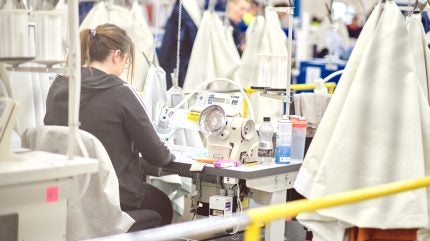
The UKFT’s specific actions, which incorporate insights from various fashion and textile industry stakeholders, were submitted to the House of Commons Business and Trade Committee.
This request for immediate, substantial support for micro and SMEs is particularly critical as it encompasses strategies to aid exporting firms.

Discover B2B Marketing That Performs
Combine business intelligence and editorial excellence to reach engaged professionals across 36 leading media platforms.
Principal recommendations from UKFT
- Formulation of a new strategy for micro and small businesses, ensuring parity with the support available to EU counterparts, overhauling the tax and business rates system, and conducting a thorough reassessment of how SME policies are developed and implemented
- More effective representation in government, advocating for a more influential role for industry bodies in policy-making processes and a shift from generic SME guidance to specialised support that addresses the actual needs of businesses in tangible markets
- Fair competition and access to finance, pressing for definitive measures that would enable smaller firms to compete with larger corporations and international entities. This includes tax reforms, enhanced procurement opportunities, and bespoke financial solutions for businesses with turnovers below £250,000 ($336,000)
- Reinstating the Tradeshow Access Programme, making UK Export Finance (UKEF) more applicable to consumer goods sectors, and ensuring that Embassies provide substantial support to SME exporters
- Rejuvenating the high street through cost reduction, VAT-free shopping incentives for international visitors, and renewed efforts to encourage and assist independent retailers
- Addressing cost pressures is another area of concern, with calls for action on energy costs, National Insurance contributions, rent issues, as well as specific reliefs for manufacturing and retail businesses operating within the UK
- A tax system that supports domestic production and mandates that imported goods adhere to equivalent standards
- Introduction of funding effective programmes like the Manufacturing Advisory Service while discontinuing ineffective ones
- Backing family-run and smaller enterprises that are not yet prepared for private investment alongside practical export finance options for reliable markets
- Provision of industry-specific technology and innovation assistance to enhance smart productivity, rejecting inadequate digital guidance and mismatched programmes
- Cohesive action from the government, emphasising collaboration with the sector to address genuine business requirements rather than merely pursuing political objectives.
Lastly, the UKFT challenges the current government benchmarks, which it says do not correspond with standard business operations.
Instead, the association proposes an alternative evaluation method that focuses on the number of micro and SMEs engaging in export activities, their sustainable growth, and their ability to penetrate new markets.
In March this year, the UKFT introduced a new membership category to support circularity, growth and innovation within the UK’s fashion and textile industry.

US Tariffs are shifting - will you react or anticipate?
Don’t let policy changes catch you off guard. Stay proactive with real-time data and expert analysis.
By GlobalData




